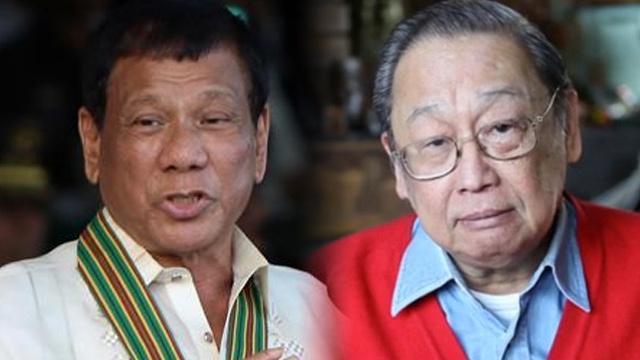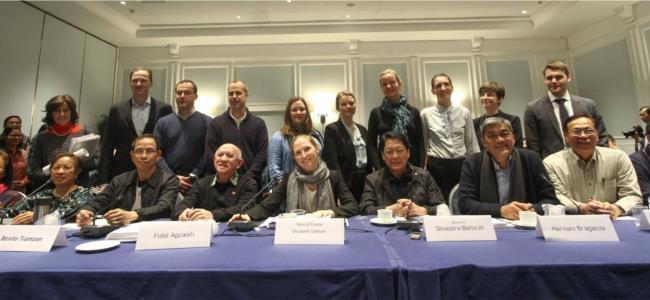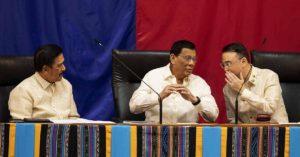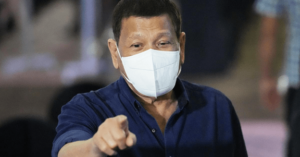
Some time ago, during the 2016 presidential elections, it was reported in the news that the Presidential candidate from Davao City, Rodrigo Duterte has asked his former professor and CCP founder-leader, Jose Maria Sison to abandon the armed struggle and join the democratic process to fight for the change the communists had been pushing for.

Duterte said, “Armed struggle as a means to achieve change is passé in the modern world we are living in today. More than 40 years of armed struggle and thousands of lives lost is too much to bear.”
True enough, after he won the 2016 presidential elections, and upon his assumption in office, President Duterte offered his hand in friendship to the communist bloc by not only offering four cabinet positions but most importantly, catechized the resumption of “peace negotiations” between the Communist Party of the Philippines-New Peoples’ Army-National Democratic Front (CPP-NPA-NDF) and the Government of the Philippines (GRP).
With the stalled peace negotiations between the world’s longest-running armed insurgency group, the CPP-NPA-NDF and the GPH under the previous administrations, upon his assumption into office in July 2016 President Duterte immediately resumed peacetalks with the communist group after three decades of impasse since 1986.
The peacetalks to a greater extent presented some kind of hope and a prospect that a long-lasting peace will be achieved between the two sides under the Duterte administration.
At the onset, Duterte was very much open and willing to negotiate and talk with the communist faction to achieve a peace deal which paved the way for
(a) the revival of the peace panels from both sides of the political fence,
(b) the declaration of indefinite unilateral ceasefires from both parties as an emblem of sincerity, which to a greater degree lessened the level of violence and military confrontations between the government forces and the NPAs on the ground from August 2016 to January 2017; and
(c) the release of 22 detained political prisoners (top cadre leaders of the CPP) as an expression of goodwill and confidence-building gesture on the part of the Philippine government.
Peace Talks No More
But President Duterte in his regular weekly address to the nation declared that under his term as president and commander in chief of the armed forces of the Philippines (AFP), he will not anymore entertain “peacetalks” with CPP-NPA-NDF “ever again” for the rest of his term. “There will be no ceasefire ever again under my term (as President). For all intents and purposes, the ceasefire is dead,” he said.
Such declaration coming from Duterte was well-received not only by the men and women in uniform of the Armed Forces of the Philippines (AFP) and Philippine National Police (PNP) but also by many if not all of his supporters.
In a press statement the following day, Marine Maj. Gen. Edgard Arevalo, the AFP spokesperson Arevalo said, “We are thankful to the Commander-in-Chief for heeding the AFP’s recommendation not to declare ceasefire this holiday season and beyond – not because we do not want peace, but because what we advocate is a genuine and lasting peace.”
He reiterated that a sense of lasting peace cannot be achieved through a peace settlement with the NPAs because they are “notoriously insincere and unworthy of public trust”. He further pointed out that in the past, even under an agreed ceasefire, the NPAs still attacked and killed soldiers on “humanitarian and peace and development missions.” This is according to him is a painful experience for the AFP in dealing with communist terrorists.
Whereupon, Chief Debold Sinas of the PNP also expressed support for the decision of President Duterte not to enter into peace talks and ceasefire with the renegade CPP-NPA-NDF.
Why Peace Talks Collapsed?
One of the fundamental reasons why the peacetalks with CPP-NDF-NPA did not work under the Duterte administration in the same manner that it did not work as well during the previous administrations is because of the imposition of preconditions by the communist group which goes against the Philippine Constitution like for instance its demands for a “coalition government.”
Duterte will never bend to such preposterous prerequisites.
“I walked away from the talks because we cannot understand each other. Maybe we were talking in different dialects. I don’t know why. But I just simply cannot understand the way it is being played by the other side.
“What was evolving before me was something that it is not acceptable to the Republic of the Philippines, especially this coalition government. No president, no stupid president will allow it. He will get impeached.”
He further emphasized that the “power-sharing” that the CPP-NPA-NDF was asking from him was not possible. “You are not supposed to share that power. Ako, may sinumpaan(I took an oath). Those powers are given to me under the law, only to be exercised unless they are capable of being delegated. I cannot compromise anything in this government. It’s either I will be impeached or the military and the police will shoot me,” Duterte contended.
Likewise, the peace negotiations with communist rebels collapsed because the CPP-NPA-NDF failed to comply with the four preconditions set by the Duterte administration in pursuance of the peace process, which for the GPH is a sign of insincerity and unworthiness of public trust. These four preconditions are: (1) no coalition government; (2) no arson/attacks; (3) no revolutionary tax/extortions; and (4) no recruitment/mass mobilization.
However, even under an agreed unilateral ceasefire, the NPAs continued to attack and kill civilians and government soldiers, and even intensified extortion activities.
Moreover, Defense Secretary Delfin Lorenzana also expressed in a media statement he made in 2018 that one of the reasons why he backed the termination of the problematic peace negotiations with the insurgent communist group was because the said group had plans to oust President Duterte.
Lorenzana said that they found out that during the last unilateral ceasefire covering the period 2016 until January 2017, the CPP/NDF held the largest and the 2nd People’s Congress in October to November 2016 and the Central Committee Plenum on December 2016.
According to the defense chief, “it was during these two gatherings that the communist group concocted its three-year plan to advance the revolutionary struggle to include the execution of the Oust Duterte Movement if President Duterte will not agree to a coalition government.”
The defense chief cited that the communist group formally launched “Oust Duterte” in May 2017 to culminate in October 2018. Lorenzana also argued that the communist rebels were using the ceasefire accommodation to consolidate and recover their lost ground and expand their influence. Hence, from the looks of it, the GPH felt betrayed by the communist rebel group in so many ways.
Conclusion
Hence, for the nth time, the long-sought “peace-pact and political settlement” between GPH and the CPP-NPA-NDF remains as elusive as it was since time immemorial. The elusive peace settlement and negotiations between the GPH and the CPP-NDF-NPA that started in 1986 after the EDSA Revolution more or less 34 years ago, indeed continue to remain elusive with the recent statements of President Duterte on the matter.
This just goes to show that a call for a peace process is easier said than done. As depicted by the collapse of the peace process between the GPH and the CPP-NPA-NDF under the Duterte administration and even of the past administrations, one can surmise that the “devil is in the details,” and also, any peace process is dependent on each side’s orientation, attitudes and stands on issues covered by the peace negotiations.
For instance, if the CPP-NPA-NDF will continue its hardline stance in asserting their preconditions to a peace process with GPH, no administration even beyond Duterte’s term will ever negotiate with them about peace. Simply because no president will ever concede to their contemptible, outrageous, and unrealistic terms.
Also, unless the communist terrorists shift its paradigm, negotiating a peace settlement with them will never work and any peace negotiation that the GRP enters into with the communist rebel group will always be problematic.
To ask for the “moon and the stars” like a “coalition government and power-sharing” is way too much and already beyond the limits. Given that there is not much sincerity, trustworthiness, and meaningful commitment on the part of the Jose Maria Sison’s side of the panel, concurring to peace talks with them is no more than a charade and a sham.
Duterte would rather pursue more localized peace talks, dialogue, and engagements at the community level with the rebel group without violating the Constitution.
The process put forward by the National Task Force to End Local Communist Armed Conflict (NTC-ELCAC) is more honest that even to the insurgents is more credible. This is why Balik-Loob Program is succeeding with flying colors.
As of this writing, 313 communist rebels from Northern Luzon surrendered and added themselves to the 13,460 who have already availed of President Duterte’s Balik-Loob as of August 2020.
Twenty-seven government agencies have formed a “whole nation” approach to form a solidarity with local government units to welcome former rebels wanting to return to the fold of law and to their own families and communities.
Digong can only be damn serious because he asked the Philippine Congress to support this campaign to literally remunerate laying down of arms, financially assist the returnee’s transition to normal lives, offer medical and employment benefits to his family and educational benefits to his children. Those unskilled among them are trained under TESDA and DOLE. If they want to put up a business, DTI makes a strategic intervention in terms of capability and confidence building, and loans.
The only future that awaits those who choose peace is productivity, this time hand-in-glove with a government that was never there for them before.
Enough is enough going around in circles, fooling each other and the Filipino people, and wasting precious time, energy, finances, and other resources in an exhausting, cyclical and futile exercise.
Source: Sovereign PH
https://sovereignph.com/2020/12/13/why-talking-peace-with-communist-terrorists-is-an-exhausting-cyclical-and-futile-exercise/



